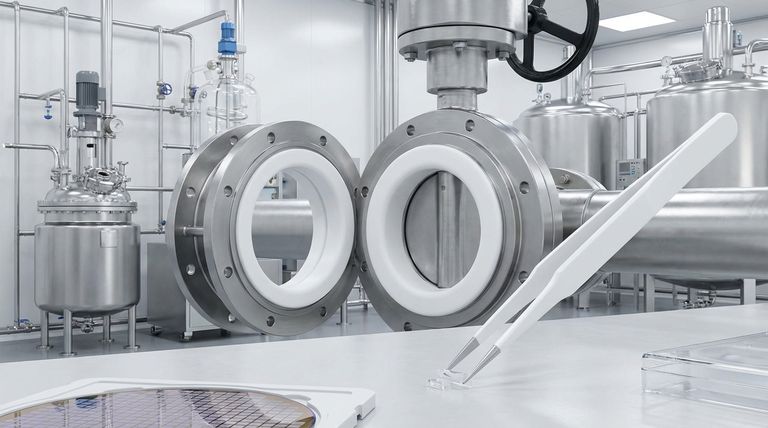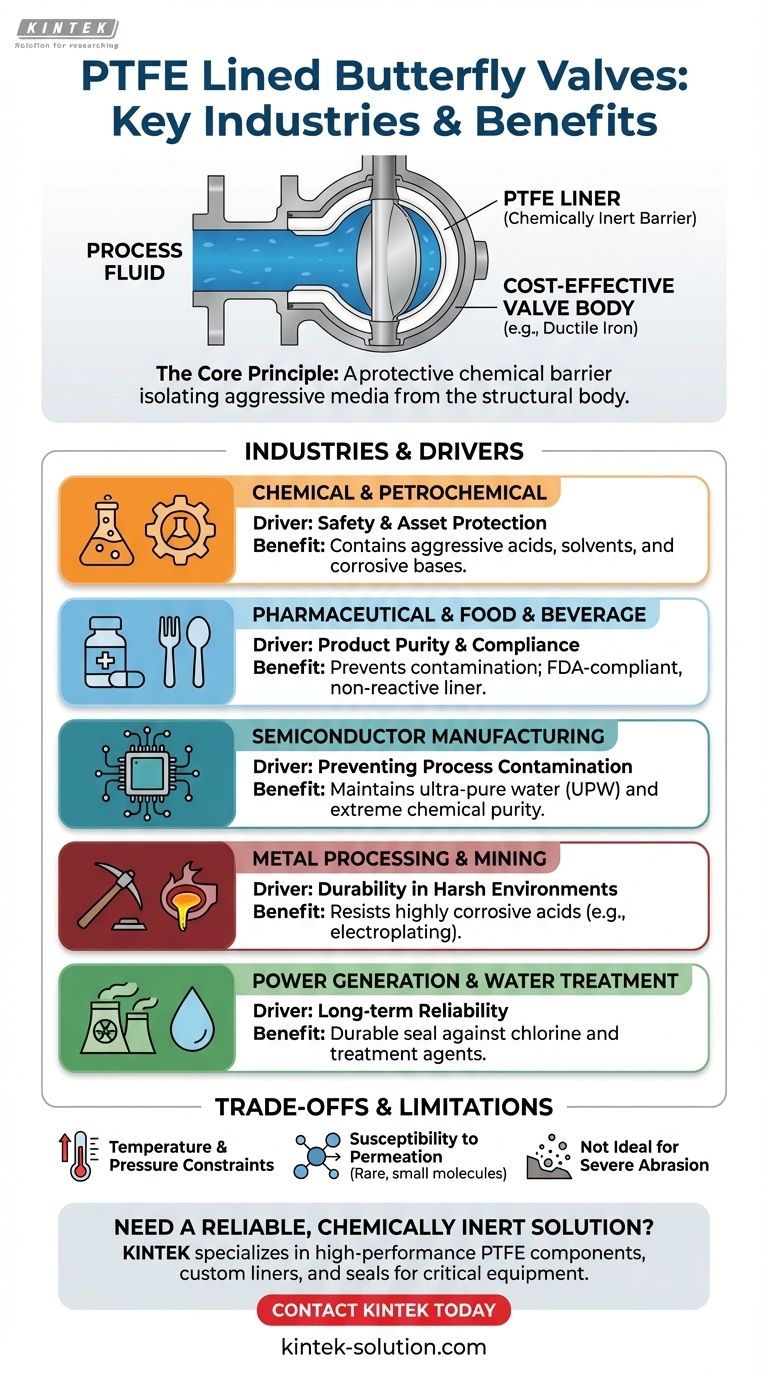PTFE lined butterfly valves are critical components in a wide range of industries, most notably chemical processing, pharmaceuticals, semiconductor manufacturing, and metal processing. Their value stems from the exceptional chemical inertness of Polytetrafluoroethylene (PTFE), which isolates aggressive or high-purity media from the valve's structural body.
The core benefit of a PTFE lined butterfly valve is its ability to provide near-universal chemical resistance using cost-effective body materials. This design allows industries to safely manage highly corrosive or ultra-pure fluids without resorting to expensive, exotic metal alloys for the entire valve body.

The Core Principle: A Protective Chemical Barrier
To understand why these valves are so widely adopted, you must first understand their fundamental design principle. The performance comes not from the valve's metal body, but from the liner that completely covers all wetted parts.
What is PTFE?
PTFE, or Polytetrafluoroethylene, is a high-performance fluoropolymer. Its primary characteristic is being chemically inert to nearly all industrial chemicals, acids, and bases.
How the Lining Works
The valve's interior is fitted with a thick, molded liner of PTFE. This liner acts as a complete barrier between the process fluid and the valve body, which is typically made of a less expensive material like ductile iron or carbon steel. The fluid only ever touches the inert PTFE, ensuring both the media's purity and the valve's structural integrity.
Key Industrial Applications and Their Drivers
Different industries leverage PTFE's unique properties to solve distinct challenges, from preventing hazardous leaks to ensuring absolute product purity.
Chemical and Petrochemical Processing
This is the most common application. These facilities handle a vast array of aggressive substances, including strong acids, solvents, and corrosive bases. The primary driver here is safety and asset protection, as the PTFE liner prevents the hazardous media from corroding and destroying the valve.
Pharmaceutical and Food & Beverage
In these industries, the primary concern is preventing contamination. The drivers are product purity and compliance. PTFE is non-reactive, does not leach contaminants into the media, and can be used in clean-in-place (CIP) and sterilization systems. Many PTFE formulations are FDA-compliant for these applications.
Semiconductor Manufacturing
Semiconductor fabrication relies on ultra-pure water (UPW) and extremely harsh chemicals for etching and cleaning. The driver is preventing process contamination. Even minuscule metallic ion contamination from a standard valve can ruin an entire batch of microchips. PTFE's inertness ensures the purity of the process fluids is maintained.
Metal Processing and Mining
Operations like electroplating, acid recovery, and surface treatment involve highly corrosive acids. The primary driver is durability in harsh environments. PTFE lined valves provide a robust and cost-effective solution for managing these fluids, which would rapidly destroy most unlined metal valves.
Power Generation and Water Treatment
These sectors frequently use chemicals like chlorine, sulfuric acid, and other treatment agents. The main driver is long-term reliability and low maintenance. A PTFE lined valve offers a durable seal and resists chemical attack over long periods, ensuring operational stability.
Understanding the Trade-offs and Limitations
While highly versatile, PTFE lined valves are not a universal solution. An objective assessment requires understanding their operational limits.
Temperature and Pressure Constraints
PTFE has an impressive operational temperature range (often cited as -196°C to 200°C), but it is a polymer, not a metal. In applications involving extreme temperatures or pressures that exceed the manufacturer's rating, an all-metal or ceramic-lined valve may be necessary.
Susceptibility to Permeation
While PTFE is highly resistant, very small molecules like certain gases or halogens can slowly permeate the liner over extended periods. This is a rare consideration but can be critical in specific high-purity or highly toxic service applications.
Not Ideal for Severe Abrasion
PTFE is a relatively soft material. While suitable for some slurries, highly abrasive media with sharp particles can eventually wear down the liner. For services with severe abrasion, a ceramic or rubber-lined valve might be a more durable choice.
Making the Right Choice for Your Goal
Your specific goal determines whether a PTFE lined butterfly valve is the optimal choice for your application.
- If your primary focus is containing aggressive chemicals safely and cost-effectively: A PTFE lined butterfly valve is often the default choice due to its broad chemical compatibility and economical design.
- If your primary focus is maintaining absolute product purity: Ensure the valve's liner meets the necessary pharmaceutical or food-grade standards (e.g., FDA compliant) to prevent any leaching or contamination.
- If your primary focus is handling high temperatures or severe abrasion: You must verify the specific temperature and pressure limits of the valve and consider specialized, more robust valve types if your process exceeds PTFE's capabilities.
Understanding these core principles allows you to move beyond a simple component choice and select a true solution for your fluid control challenge.
Summary Table:
| Industry | Primary Driver | Key Benefit of PTFE Lining |
|---|---|---|
| Chemical & Petrochemical | Safety & Asset Protection | Contains aggressive acids and solvents |
| Pharmaceutical & Food & Beverage | Product Purity & Compliance | Prevents contamination, FDA-compliant |
| Semiconductor Manufacturing | Preventing Process Contamination | Maintains ultra-pure water (UPW) and chemical purity |
| Metal Processing & Mining | Durability in Harsh Environments | Resists corrosive acids for electroplating, etc. |
| Power Generation & Water Treatment | Long-term Reliability & Low Maintenance | Durable seal against chlorine and treatment chemicals |
Need a reliable, chemically inert valve solution? KINTEK specializes in manufacturing high-performance PTFE components, including custom-fabricated liners and seals for valves and other critical equipment. Our expertise in precision production for the semiconductor, medical, laboratory, and industrial sectors ensures you get a solution tailored to your specific chemical resistance and purity requirements, from prototypes to high-volume orders.
Contact KINTEK today to discuss how our PTFE expertise can solve your fluid control challenges.
Visual Guide

Related Products
- Custom PTFE Parts Manufacturer for Teflon Parts and PTFE Tweezers
- Custom PTFE Parts Manufacturer for Teflon Containers and Components
- Custom PTFE Measuring Cylinders for Advanced Scientific and Industrial Applications
- Custom PTFE Sleeves and Hollow Rods for Advanced Applications
- Customizable PTFE Seals Filter Holders for Versatile Applications
People Also Ask
- What factors should be considered when choosing between Nylon and PTFE? Select the Right Material for Your Application
- What are the main applications of PTFE type Teflon? Unlock Its Versatility for Your Industry
- What chemical processing applications involve PTFE-machined parts? Essential Components for Corrosive & High-Purity Systems
- What industrial benefits do PTFE-machined parts offer? Achieve Peak Performance in Demanding Applications
- What finishing techniques are effective for machined Teflon parts? Achieve Functional Performance and Dimensional Stability



















